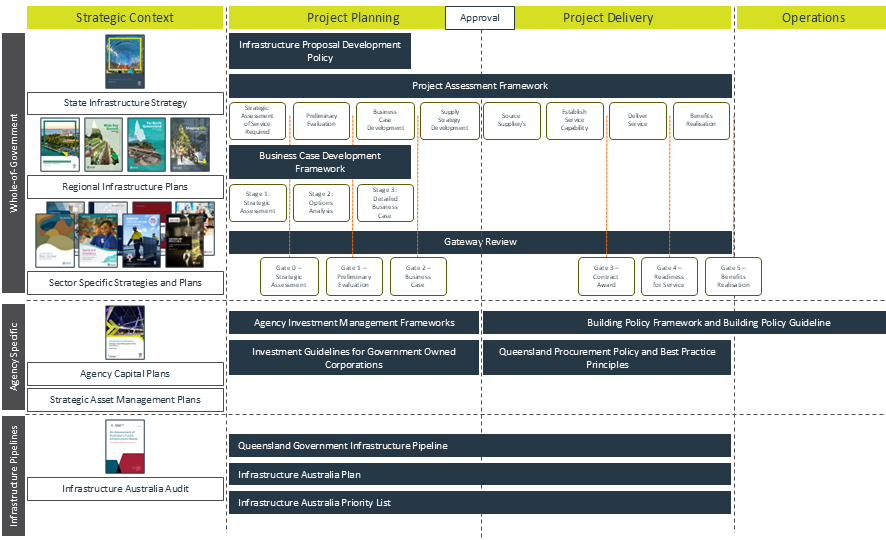The flowchart diagram depicts four columns and three rows. The elements identified in the diagram are horizontally align to rows and vertically aligned to columns.
Flowing from left to right, the diagram separately records the column headings: Strategic Context, Project Planning, Project Delivery, and Operations. Located directly between the Project Planning and Project Delivery phase is the Approval phase.
The first row (i.e. Row 1) of the diagram is titled Whole-of-Government. This row identifies diagram elements which all government infrastructure should be developed with consideration to.
The vertical alignment of the elements in Row 1 is described below:
- The State Infrastructure Strategy, Regional Infrastructure Plans, and Sector Specific Strategies and Plans are recorded separately and are vertically aligned under the Strategic Context heading.
- Above the State Infrastructure Strategy, is an image of its (i.e. the document’s) cover page.
- Above the Regional Infrastructure Plans, there are images of the four published Regional Infrastructure Plans’ cover pages: Central and Western Queensland Infrastructure Plan, Wide Bay Burnett Regional Plan, Far North Queensland Infrastructure Plan, and Shaping SEQ Regional Plan. The images are horizontally aligned and evenly spaced.
- Above the Sector Specific Strategies and Plans, there are eight images of cover pages from various agencies published strategies and plans. The images are horizontally aligned across two rows and there are four images per row. The rows are staggered to the right-hand side as follows:
- Row A: Queensland Water Strategy, Equity and Excellence, Queensland Energy and Jobs Plan, and Queensland Biofutures 10-Year Roadmap and Action Plan.
- Row B: Queensland Road Safety Strategy 2022 – 2031, Our Thriving Digital Future: Queensland’s Digital Economy Strategy, The Queensland Health and Hospitals Plan, and Queensland Cancer Strategy 2024.
- The Infrastructure Proposal Development Policy (IPDP) is vertically aligned under the Project Planning phase.
- The Project Assessment Framework (PAF) is vertically aligned under both the Project Planning and Project Delivery phase.
- The PAF’s eight stages are recorded under its heading. The first four PAF stages occur during Project Planning phase, separated by the Approval phase, the final four PAF stages occur during the Project Delivery phase. Flowing left to right, the PAF stages are: Strategic Assessment of Service Required, Preliminary Evaluation, Business Case Development, Supply Strategy Development, Source Supplier/s, Establish Service Capability, Deliver Service, and Benefits Realisation.
- The Business Case Development Framework (BCDF) is vertically aligned under the Project Planning phase. The BCDF’s three stages are recorded under its heading. The three stages are: Stage 1: Strategic Assessment, Stage 2: Options Analysis and Stage 3: Detailed Business Case.
- The Gateway Review process is vertically aligned under the Project Planning phase. The six stages of the Gateway Review process are recorded under its heading: Gate 0 – Strategic Assessment, Gate 1 – Preliminary Evaluation, Gate 2 – Business case, Gate 3 – Contract Award, Gate 4 – Readiness for Service, and Gate 5 – Benefits Realisation.
The vertical alignment between the IPDP, PAF, BCDF and Gateway Review process in Row 1 is as follows:
- The IPDP and PAF Strategic Assessment of Service Required stage aligns with the BCDF’s Stage 1: Strategic Assessment. The Gateway Review process’ Gate 0 – Strategic Assessment occurs directly after (i.e. once the PAF Strategic Assessment of Service Required stage and the BCDF Stage 1: Strategic Assessment concludes).
- The IPDP and PAF Preliminary Evaluation stage aligns with BCDF’s Stage 2: Options Analysis. The Gateway Review process’ Gate 1 – Preliminary Evaluation occurs directly after.
- The IPDP and PAF Business Case Development stage aligns with the BCDF’s Stage 3: Detailed Business Case. The Gateway Review process’ Gate 2 – Business Case occurs directly after.
- The PAF Supply Strategy Development, Source Supplier/s, and Establish Service Capability stage does not align to any Gateway Review processes.
- After the PAF Stage Establish Service Capability, the Gateway Review process’ Gate 3 – Contract Award occurs.
- After the PAF Stage Deliver Service, the Gateway Review process’ Gate 4 – Readiness for Service occurs.
- Finally, after the PAF Stage Benefits Realisation, the Gateway Review process’ Gate 5 – Benefits Realisation occurs.
The second row of the diagram is titled Agency Specific (i.e. Row 2). This row identifies the diagram elements which are agency specific, thus, what each individual agency should give consideration to when developing government (agency specific) infrastructure.
The vertical alignment of the elements in Row 2 is described below:
- The Agency Capital Plans and Strategic Asset Management Plans are vertically aligned under the Strategic Context heading.
- Above the Agency Capital Plans and Strategic Asset Management Plans, is an image of the Strategic Asset Management Plans cover page.
- The Agency Investment Management Frameworks and Investment Guidelines for Government Owned Corporations are vertically aligned under the Project Planning phase.
- The Building Policy Framework and Building Policy Guideline is vertically aligned under both the Project Delivery and Operations phase.
- The Queensland Procurement Policy and Best Practice Principles are vertically aligned under Project Delivery phase.
The third and final row of the diagram is titled Infrastructure Pipelines (i.e. Row 3). This row identifies federal and state Infrastructure pipelines which provide industry, potential investors and all levels of government with information about infrastructure projects currently underway.
The vertical alignment of the elements in Row 3 is described below:
- The Infrastructure Australia Audit is vertically aligned under the Strategic Context phase.
- Above the Infrastructure Australia Audit, is an image of the Infrastructure Australia Audit’s cover page.
- The Queensland Government Infrastructure Pipeline, Infrastructure Australia Plan, and Infrastructure Australia Priority List are vertically aligned under both the Project Planning and Project Delivery phase.
- There are no infrastructure pipelines or diagram elements that align to the Operations phase.


